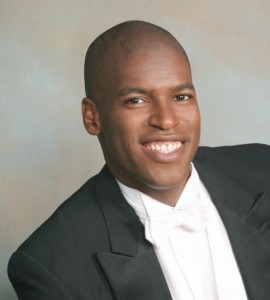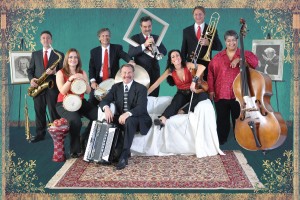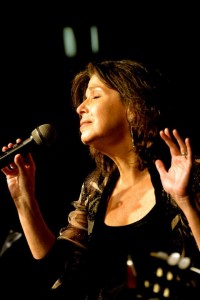
Black, Jewish cultural links explored in Guava Rugelach recital
Growing up in the Florida-panhandle town of Niceville, Lloyd Reshard remembers hearing the spirit really move the older members of his Southern Baptist congregation.
“They would just be completely a cappella, and they would be these long, drawn-out things. They would sing ‘Guide Me, O Thou Great Jehovah’ … and they would sing some melody that was nowhere near the melody you would know in the hymnal,” Reshard said, and then sang a melismatic, minor-mode illustration of what he was talking about.
“And the whole congregation would just break out into this. And part of me was thinking, ‘This is what it means to be spiritual,’” he said.
This Sunday afternoon, Reshard, a bass-baritone, gives a concert of African-American spirituals and songs by Jewish composers during the seventh annual Guava Rugelach Festival in Miami Beach. It’s a two-day series of concerts devoted to Jewish culture as seen through a tropical viewfinder, and includes the Klezmer Company Orchestra, directed by Aaron Kula of Florida Atlantic University, Sephardic singer Susana Behar, the Second Avenue Jewish Chorale and the Shir Ami Ensemble performing with the Amernet String Quartet.
Reshard, executive director of arts at St. John’s, plans to illustrate the connections between black and Jewish culture, a link of shared sympathy that goes back centuries.
“We are linked by oppression, but now we’re coming to a point where we can appreciate one another’s culture amicably. I’ll want to talk about that and bring it to the forefront,” he said.
The Klezmer Company Orchestra.
Reshard’s half-hour program includes songs by Jewish composers of the Great American Songbook: George Gershwin’s “I Got Plenty o Nuttin’,” from Porgy and Bess, and “Ol’ Man River,” from Jerome Kern’s score for Showboat.
“Showboat was so important at the time [1927] because it was one of the first shows to talk about interracial relations,” Reshard said. “It was something that would not have been thought to be expressed at the time it was written.”
And the Gershwin selection is “where the drama comes in” for the program, he said.
“When Porgy and Bess came out as an opera [1935], the black community absolutely detested it,” he said, although the work quickly became, and remains, a classic of the American theater.
“George and Ira Gershwin were trying to show what life was like for black people at the time, but on the flip side, black people felt that ‘Oh, you’re just trying to patronize us, and exaggerate our state, and make us look bad.’”
Reshard said that the opera came out into an America that still had white Jewish performers such as Al Jolson doing blackface, and it was caricatures like that which led to a “disconnect” between the two cultures.
“Go Down, Moses,” one of the best-known of all spirituals, is on the program, as is a song by Lead Belly, the early 20th-century folksinger and brawler who was discovered for the wider world by John Lomax when the singer was doing time for murder at Angola State Prison in Louisiana. Reshard will accompany himself on the guitar, as Lead Belly did, in the 1933 political blues Mr. Hitler (“We’re going to tear Hitler down/We’re going to tear Hitler down someday”).
“Black people early in the 20th century were very aware of what was going on in the world, even through all the struggles and oppression. They were very much aware of the time,” said Reshard, who earlier this year sang an entire set of Lead Belly songs at St. John’s in a recital he called “Over Jordan.”
Another great African-American musician, the singer and pianist Nina Simone, is evoked with Reshard’s programming of “Eretz Zavat Chalav (Land of Milk and Honey),” which Simone used to perform in honor of the legendary Jewish songwriter Shlomo Carlebach (here she is doing the song).
Reshard said the connections between the cultures are also evident in the similarity of the old folk melodies they share. He performs frequently at the Bet Shira synagogue in Miami, and can hear the connections when he sings for a Jewish service.
“It was so powerful for me to be able to sing with an a cappella group of eight singers, with their cantor, for their High Holy Days services,” he said. “How beautiful it was to sing these ancient melodies, and hear the cantor sing these melismatic phrases while we’re singing these beautiful harmonies underneath.”
Many Christians are unaware of these traditions, he said. “I think they would be surprised to see how deep artistically and musically the Jewish culture goes, and sometimes how similar the services are,” Reshard said.
Singer Susana Behar.
The festival proper, based at Temple Israel on 19th Street, opens Saturday night with “Of Essence and Time,” a piece exploring the common roots of flamenco and Sephardic song in Spain’s Andalusia region. Behar will be joined by flamenco guitarist Jose Luis Rodriguez and Nu Flamenco dancer Niurca Marquez.
Reader Deborah Sherman joins Kula and the KCO on Sunday afternoon at 1 p.m. for a children’s concert featuring a multimedia presentation of Heidi Smith Hyde’s children’s book Mendel’s Accordion. The KCO performs Latin-tinged klezmer at 2 p.m. followed by Reshard at 2:30, and at 3 p.m., it’s the Second Avenue Jewish Chorale, with a program of music from the Jazz Age of the 1920s.
At 3:30 p.m., the Shir Ami group collaborates with the Amernet, long the resident ensemble at Florida International University, in music by Jewish composers who were suppressed because of their ethnicity. Behar returns at 4 p.m. with singer Alejandra Czarny for a recital of Ladino and Yiddish lullabies. The festival ends with all hands on stage at 4:30 p.m. for a “Guava Jam,” which will include, Reshard says, a mass singing of “Go Down, Moses.”
One of the great lessons of the festival is that these cultural artifacts speak to our common humanity, Reshard said.
“That’s the challenge for all of us as artists. We always have to be able to bring in the heart ― even if we’re just arranging the song ― keeping the heart of what it is,” he said. “I think that’s why black culture and Jewish culture have been able to appreciate one another’s music. It reminds us of something that is innate in all of us.”
Jared Peroune, choir director at Wesley Chapel in Fort Lauderdale, will be Reshard’s accompanist. Tickets range from $10 to $45; more information is available at www.nextat19th.org.
Recent Content
-
Artsarticle ·
-
Artsarticle ·
-
Artsarticle ·


